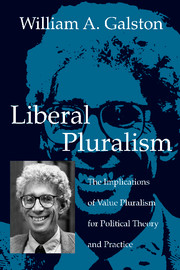Book contents
- Frontmatter
- Contents
- Acknowledgments
- LIBERAL PLURALISM
- I INTRODUCTION
- II FROM VALUE PLURALISM TO LIBERAL PLURALIST THEORY
- III THE PRACTICE OF LIBERAL PLURALISM
- 7 Democracy and Value Pluralism
- 8 Parents, Government, and Children: Authority over Education in the Liberal Pluralist State
- 9 Freedom of Association and Expressive Liberty
- 10 Liberal Pluralism and Civic Goods
- Index
8 - Parents, Government, and Children: Authority over Education in the Liberal Pluralist State
Published online by Cambridge University Press: 20 March 2010
- Frontmatter
- Contents
- Acknowledgments
- LIBERAL PLURALISM
- I INTRODUCTION
- II FROM VALUE PLURALISM TO LIBERAL PLURALIST THEORY
- III THE PRACTICE OF LIBERAL PLURALISM
- 7 Democracy and Value Pluralism
- 8 Parents, Government, and Children: Authority over Education in the Liberal Pluralist State
- 9 Freedom of Association and Expressive Liberty
- 10 Liberal Pluralism and Civic Goods
- Index
Summary
INTRODUCTION
Contemporary debates about education in the United States occur within a context of assumptions that we take for granted without much thought, as follows: The government has the right (and perhaps duty) to require the education of all children up through the midteens and to regulate some basic features of their education. Parents bear principal responsibility for seeing to it that their children meet this requirement, but they have the right to choose among a wide range of options for meeting it. While government has the right to tax all its citizens to finance and operate a system of public schools open to all, it cannot create a public school monopoly that prevents parents from sending their children to nonpublic schools.
Each of these assumptions was contested earlier in our history; all now enjoy near-universal support. In my judgment, this shift represents more than bare historical contingency or practical necessity. These widely accepted assumptions are consistent with liberal pluralist theory, as well as with the practical requirements of life in liberal democracies under modern circumstances.
The underlying theory goes something like this: In establishing the aims of – and control over – education, three sets of considerations must somehow be coordinated. First, the conditions for the normal development of children must be secured, their ability to become contributing members of the economy and society must be fostered, and the growth over time of their capacity for sound independent judgment must be recognized.
- Type
- Chapter
- Information
- Liberal PluralismThe Implications of Value Pluralism for Political Theory and Practice, pp. 93 - 109Publisher: Cambridge University PressPrint publication year: 2002



